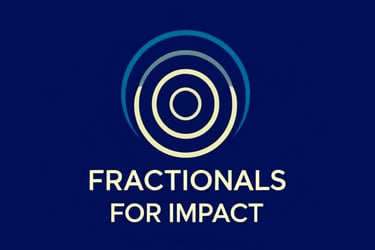Are We Living in the Way Back Machine? Why the Future of Impact Measurement Looks alot like the Past.
Traditional monitoring and evaluation systems are too slow and too removed from reality to help nonprofits navigate today's volatile landscape. Learn how shifting from extractive reporting to living, people-centered learning systems can transform your organization's ability to adapt and respond.
Bridget Leigh Snell with Abimibola Akinyemi and Sumananjali Mohanty
10/23/20254 min read


Here is a question that keeps us up at night: What if the most innovative approach to measuring nonprofit impact is not forward-looking at all (sorry AI!) - but rather a return to principles and practices, we abandoned a decade (or so) ago?
My colleagues and Associates, Sumananjali Mohanty, Abimibola Akinyemi and I were collaborating on a pitch for a major international nonprofit. During the process we discussed our best experiences of monitoring, evaluation, accountability and learning (aka "MEAL") in a programmatic context. We remembered our best experiences where we left communities and our peers empowered by the process and not demoralized. What was different? In each case, communities were not just data sources-they were knowledge creators. Learning was not an afterthought-it was the engine of adaptation. And, then we noted that somewhere along the way around ten years ago something shifted.
From 2016 onward - MEAL became increasingly extractive. Results-oriented frameworks and randomized control trials dominated. The pendulum swung hard toward quantitative metrics that satisfied headquarters and donors (and some academics)- and it often missed what mattered most: the lived experiences and adaptive wisdom of communities and those practicing international development themselves.
Measurement became about proving impact upward rather than enabling change locally.
That era is ending. And good riddance.
Why Traditional MEAL Is Failing Us Now
Global conflict is escalating. Climate shocks are intensifying. Political instability creates constant flux. In this volatile landscape, traditional MEAL frameworks-designed to extract knowledge from communities and deliver it upward to senior leadership and donors-are fundamentally unfit for purpose.
They are too slow. Too removed from ground realities. Too dependent on external validation to enable the adaptive, responsive action our times demand.
Think about it: When a humanitarian crisis erupts or a political landscape shift overnight, can your organization really wait six months for an external evaluation to tell you what is working? Of course not. Yet that is exactly what many MEAL systems still require.
The Way Forward Is Actually the Way Back
Here is the paradigm shift: The organizations that will remain effective and relevant are those that have built their MEAL systems not as reporting mechanisms, but as living learning infrastructures that put the power to know, learn, and act at the frontlines of change. This means returning to-and evolving-the people-centered principles that worked so well in that earlier era:
Local Actors as Primary Sense-Makers. Those navigating volatile contexts daily should be equipped to monitor shifts and interpret what changes mean for their strategies. They need to adapt in real-time without waiting for external evaluations or headquarters approval.
Strategic Monitoring as the Engine. Rather than treating evaluation as a separate compliance exercise, integrate continuous local monitoring of change directly into everyday work. The most critical knowledge about what is changing, how, and why comes from frontline staff, partners, and communities.
Participatory Learning Rhythms. Create equitable spaces where multi-stakeholder coalitions-from international organizations to community participants-collectively make sense of change and adapt strategy. This approach often identifies critical insights and strategic adjustments ahead of formal evaluations.
Technology as Connector, Not Controller. Leverage digital infrastructure to connect people and facilitate knowledge exchange, not to centraliize data extraction. Platforms should enable conversation and co-creation, breaking hierarchical patterns where data gathering happens at the grassroots while knowledge products are created at headquarters.
What This Looks Like in Practice
We worked with multiple international organizations undergoing transformation in their MEAL approach. They were trapped in the old model: lengthy reports flowing upward, external evaluations arriving too late to inform decisions, and frontline staff who felt like data collectors rather than learning partners.
We started with an honest assessment: Was the organization actually ready for change? What cultural shifts were needed? Who had appetite for transformation?
We co-designed interventions that put evaluative thinking into daily practice. We established structured peer learning processes where colleagues could reflect on each others work in trust-based exchanges. We created regular rhythms where cross-functional teams examined evidence of change together and made real- time strategy adjustments.
The result? Staff, front-line practitioners, and partners became the primary consumers and drivers of evaluation-not passive subjects of it. Learning happened continuously, not just at prescribed reporting intervals. And most importantly, the organization became more adaptive and responsive to the communities they served.
The Decolonial Imperative
There is another critical dimension to this shift: transformative MEAL must reflect feminist, decolonial, and anti- racist principles. The extractive model of the past decade was not just inefficient-it perpetuated colonial dynamics where Northern headquarters ' knew' and Southern partners merely ' reported. '
People-centered MEAL challenges this fundamentally. It repositions all actors as equal participants in a global learning network. It values diverse forms of evidence-quantitative, qualitative, and lived experience-rather than privileging metrics that satisfy donor compliance. It ensures that those most affected by development interventions have voice, agency, and decision-making power in how change is understood and pursued.
Building MEAL That Embodies Transformation
If your organization is serious about transformation-not just in your programs but in how you operate-your
MEAL frameworks that transform organizational learning and adaptation must embody that change. It cannot simply measure transformation; it must reflect transformative values throughout.
This requires focusing on three interconnected layers:
People and Culture - the foundation of change. Build organizational capacity for evaluative thinking and collective learning. Create safe spaces for honest reflection.
Processes and Practices - the pathways for change. Design participatory learning rhythms that integrate MEAL into everyday work rather than treating it as compliance.
Tools, Training, and Technology - the enablers of change. Equip diverse staff with accessible MEAL tools. Leverage digital infrastructure to connect rather than control.
The Organizations That Will Thrive
In a world of constant disruption, the organizations that will thrive are not those with the most sophisticated data dashboards or the most rigorous external evaluations. They are the organizations that have built MEAL as a living learning infrastructure-where knowledge creation happens locally, learning drives adaptation, and communities are positioned as experts in their own change.
This is not about abandoning rigor or accountability. It is about fundamentally rethinking who learns, what counts as evidence, and how organizations respond to change.
So yes, we are in a bit of a time warp. The most innovative approach to MEAL in 2025 looks a lot like the best practices of decades early - but evolved for a digital age, grounded in decolonial values, and built for a world that demands rapid adaptation.
The question is: Is your organization ready to step into this learning future by learning from the past?


